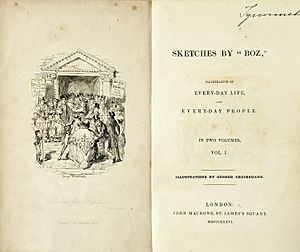Sketches by Boz facts for kids

Front cover of the first edition, February 1836. Illustrated by George Cruikshank.
|
|
| Author | Charles Dickens ("Boz") |
|---|---|
| Original title | Sketches by "Boz," Illustrative of Every-day Life and Every-day People |
| Illustrator | George Cruikshank |
| Cover artist | George Cruikshank |
| Country | England |
| Language | English |
| Series | 20 Monthly parts: November 1837 - June 1839 |
| Subject | Social criticism |
| Genre | Fiction Nonfiction Short story collection |
| Publisher | John Macrone; St. James's Square |
|
Publication date
|
Novel:1836 (in two volumes) |
| Followed by | The Pickwick Papers |
Sketches by "Boz," Illustrative of Every-day Life and Every-day People (often called Sketches by Boz) is a collection of short stories and essays. These pieces were written by the famous author Charles Dickens. The book was first published in 1836. The very first edition featured wonderful illustrations by George Cruikshank.
Contents
What are the "Sketches by Boz"?
This book is a collection of short writings by Charles Dickens. He used the pen name "Boz" when he wrote them. The sketches describe everyday life and people in London during the 1830s. Dickens wrote about many different parts of society. He showed what life was like for people from all walks of life.
How the Sketches Were First Published
Most of the fifty-six sketches in the 1839 edition first appeared in newspapers and magazines. These included The Morning Chronicle and The Monthly Magazine. They were published individually between 1833 and 1836. Dickens wrote about many topics. He covered everything from funny events to serious observations.
Examples of Early Sketches
Some of the first sketches included:
- "Mr. Minns and his Cousin" (published in The Monthly Magazine, December 1833).
- "Mrs. Joseph Porter, Over the Way" (published in The Monthly Magazine, January 1834).
- "The Bloomsbury Christening" (published in The Monthly Magazine, April 1834).
- "The Dancing Academy" (published in Bell's Life in London, October 1835).
- "The Great Winglebury Duel" (published in the First Series of Sketches by Boz, February 1836).
What's Inside the Book?
The book Sketches by Boz is divided into three main parts. These parts help organize the different types of stories. Each section gives a unique look at London life.
Our Parish
This section describes people and places in a local parish. A parish is like a small community or neighborhood. Dickens writes about the everyday characters you might meet there. He talks about the beadle (a church officer) and the schoolmaster. He also writes about the ladies' societies and the neighbors.
Stories in Our Parish
- The Beadle. The Parish Engine. The Schoolmaster.
- The Curate. The Old Lady. The Half-pay Captain.
- The Four Sisters.
- The Election for Beadle.
- The Broker's Man.
- The Ladies' Societies.
- Our Next-door Neighbour.
Scenes
The "Scenes" section takes you on a tour of London itself. Dickens describes different parts of the city. He shows what the streets were like in the morning and at night. He also writes about shops, markets, and famous places. You can read about Scotland Yard and the River Thames.
Exploring London Scenes
- The Streets - morning.
- The Streets - night.
- Shops and their Tenants.
- Scotland Yard.
- Seven Dials.
- Hackney-coach Stands.
- London Recreations.
- The River.
- Astley's (a famous circus).
- Greenwich Fair.
- Private Theatres.
- Vauxhall Gardens by Day.
- Early Coaches.
- Omnibuses.
- The Last Cab-driver, and the First Omnibus cad.
- A Parliamentary Sketch.
- Public Dinners.
- The First of May.
- Gin-shops.
- The Pawnbroker's Shop.
- Criminal Courts.
- A Visit to Newgate (a famous prison).
- Thoughts about People.
- A Christmas Dinner.
- The New Year.
- Miss Evans and the Eagle.
- The Hospital Patient.
- The Dancing Academy.
- Shabby-Genteel People.
- Making a Night of It.
- The Prisoners' Van.
Tales
The "Tales" section features longer, more detailed stories. These are fictional narratives with characters and plots. They often explore funny or sometimes sad situations. For example, "The Boarding-house" tells a story in two parts. "The Tuggses at Ramsgate" is another popular tale.
Popular Tales
- The Boarding-house.
- Chapter the first.
- Chapter the second.
- Mr. Minns and his Cousin.
- Sentiment.
- The Tuggses at Ramsgate.
- Horatio Sparkins.
- The Black Veil.
- The Steam Excursion.
- The Great Winglebury Duel.
- Mrs. Joseph Porter.
- A Passage in the Life of Mr. Watkins Tottle.
- Chapter the first.
- Chapter the second.
- The Bloomsbury Christening.
Images for kids
-
Title page of the second series (1836). The illustration by George Cruikshank shows two figures who look like the author and his illustrator waving from a balloon.
 | Aaron Henry |
 | T. R. M. Howard |
 | Jesse Jackson |



